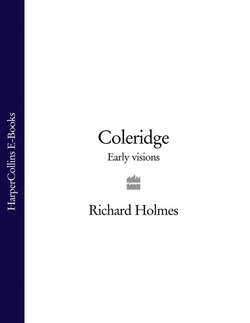Читать книгу Coleridge: Early Visions - Richard Holmes - Страница 15
9
ОглавлениеIn his first year at the King’s School (1779) an epidemic swept through the pupils, and both Sam and George lay dangerously ill isolated at the top of the School House with “putrid fever”. This is the first time that Coleridge experienced the terrible nightmares that returned to him intermittently for the rest of his life, dreams so vivid and overmastering that he would wake whole households at Stowey, at Grasmere, and even at Highgate with his screams, and which are the subject – and indeed the inspiration – of many poems. Even as a boy he tried to keep them off with a poetic charm, the old rhyming prayer, “Four Angels round me spread, Two at my foot & two at my head…”
It was to give him a lifelong sympathy not only with other children suffering night terrors, but with any adult friend on a feverish sickbed, to many of whom he would prove a tender nurse. “This prayer I said nightly – & most firmly believed the truth of it. – Frequently have I, half-awake & half-asleep, my body diseased & fevered by my imagination, seen armies of ugly Things bursting in upon me, & these four angels keeping them off.”38 The suspended condition of “half-awake & half-asleep”, with the mind floating and planing between the conscious and unconscious state, always fascinated him.
During this illness, Frank, with typical daring and “in spite of orders to the contrary”, would steal up to read Pope’s Homer to his small brother. Sam also became much closer to George, then sixteen and about to go to Oxford, a quiet, kindly, studious boy whom Coleridge would soon look on as his second father. Of the first fifty letters Coleridge is known to have written, thirty-five were to George; and the Poems of 1797 would be dedicated to him, with an epigraph from Horace, “notable among brothers for his paternal spirit”.39
He later wrote – before quarrelling with him – “My Brother George is a man of reflective mind & elegant Genius. He possesses Learning in a greater degree than any of the Family, excepting myself. His manners are grave, & hued over with a tender sadness. In his moral character he approaches every way nearer to Perfection than any man I ever yet knew – indeed, he is worth the whole family in a Lump.”40
His sister Nancy also showed great kindness at this time, and Coleridge came to idealise the brother-sister relationship: “she lov’d me dearly, and I doted on her!” To Charles Lamb, so deeply attached to his own sister Mary, he would later say in a poem of 1794 that she became his only real confidante, listening to all his “puny sorrows” and “hidden maladies”, which he poured forth “As a sick Patient in a Nurse’s arms”.41*
But in these reminiscences there is an exaggerated idealising quality, that suggests that the perfection of Nancy was really a disguised form of reproach to his real mother. John, out in India, would also make a cult of his sister, whom he had never seen, while Frank in turn idealised his old nurse, “my good, my dear, and faithful Molly”, to whom he sent money.42 Perhaps they all felt certain reservations about their mother. Yet, except for Sam, they all grew up with a marked self-confidence in personal relations. Frank would cheerfully sign a letter to Nancy, “Your affectionate and handsome brother, Francis”, adding a postscript asking if Maria Northcote was kept fully informed of his growing good looks.43
